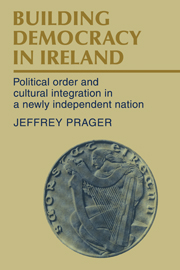 Building Democracy in Ireland
Building Democracy in Ireland Published online by Cambridge University Press: 25 October 2011
Introduction: constitutionalism and order in new nations
I have argued that an understanding of the causes of the Civil War requires an appreciation of the competing cultural orientations that existed among the Irish population. Although ostensibly a political dispute, the Civil War expressed the resurfacing of cultural differences that had been previously subordinated to the nationalist aspirations of much of the Irish community. In order to understand the challenges faced by the leaders of the Provisional Government, it is necessary to appreciate the depth of these divisions in the political community. The government's aspiration for a civil, democratic order could be fulfilled only after these divisions had somehow been resolved. Democracy depended upon widespread agreement concerning the nature and appropriate course of the independent Irish nation. Yet this account of the cultural antinomies in the nation presents only in broad outline the political challenges faced by the new leaders.
In this chapter, I will focus on the drafting of the Free State Constitution to demonstrate more contextually and concretely how these splits impeded the ability of the Provisional Government, and later the Free State Government, to produce a united political community. An examination of the drafting process, and the content of the Constitution itself, shows the impact of competing symbolic systems and value strains on the political order.
To save this book to your Kindle, first ensure [email protected] is added to your Approved Personal Document E-mail List under your Personal Document Settings on the Manage Your Content and Devices page of your Amazon account. Then enter the ‘name’ part of your Kindle email address below. Find out more about saving to your Kindle.
Note you can select to save to either the @free.kindle.com or @kindle.com variations. ‘@free.kindle.com’ emails are free but can only be saved to your device when it is connected to wi-fi. ‘@kindle.com’ emails can be delivered even when you are not connected to wi-fi, but note that service fees apply.
Find out more about the Kindle Personal Document Service.
To save content items to your account, please confirm that you agree to abide by our usage policies. If this is the first time you use this feature, you will be asked to authorise Cambridge Core to connect with your account. Find out more about saving content to Dropbox.
To save content items to your account, please confirm that you agree to abide by our usage policies. If this is the first time you use this feature, you will be asked to authorise Cambridge Core to connect with your account. Find out more about saving content to Google Drive.